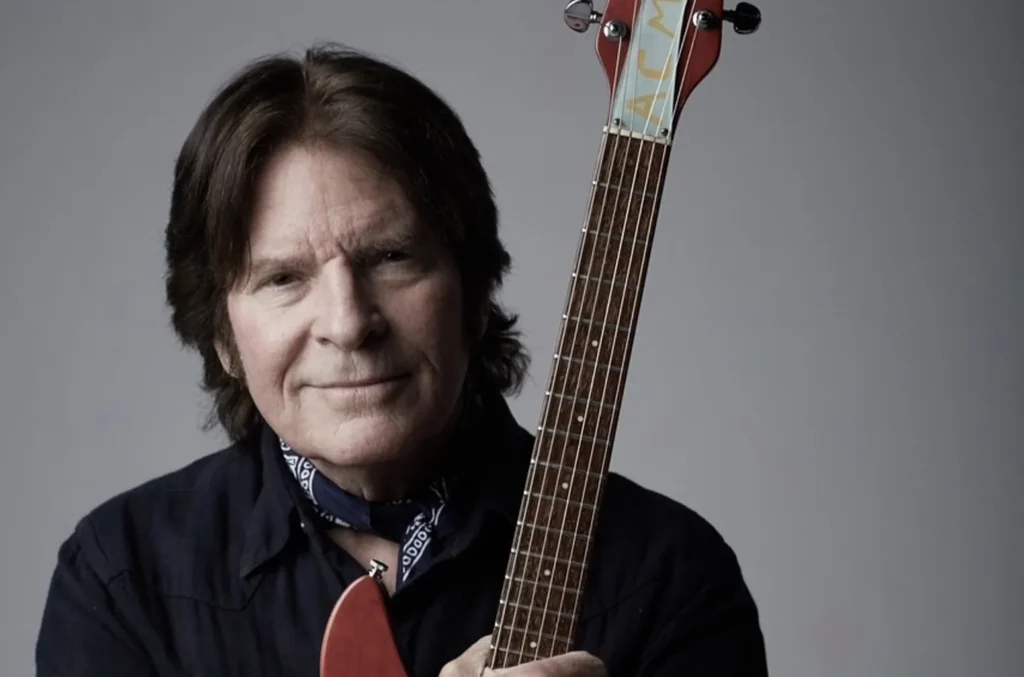
“The Old Man Down the Road” is Fogerty’s comeback in motion—an ominous, foot-on-the-gas groove that turns suspicion into prophecy, and keeps asking who’s really following you.
When John Fogerty released “The Old Man Down the Road” in December 1984, it wasn’t simply a new single—it was a public reappearance after a long, bruising silence. It was the leadoff shot from his comeback album Centerfield (released January 14, 1985), and it immediately sounded like a man reclaiming his own shadow: swampy, tense, propulsive, with that familiar Fogerty engine revving as if it had been idling for years. On the Billboard Hot 100, the song debuted at No. 61 (chart dated December 22, 1984) and climbed to a peak of No. 10 (chart dated March 2, 1985)—Fogerty’s only solo Top 10 pop hit. Rock radio embraced it even harder: it hit No. 1 on Billboard’s rock chart (then Top Rock Tracks) and stayed there for three weeks, a rare moment when his old chemistry with American radio turned into present-tense proof.
Those are the headline facts, and they matter. But the deeper story is how deliberate the sound feels—how Fogerty didn’t return by borrowing a modern costume. He returned by sharpening his own blade.
A key piece of the mood is the way Centerfield was made. As contemporary accounts of the sessions describe it, Fogerty walked into The Plant Studios in Sausalito in 1984 and chose, once again, to play the instruments and handle the vocals himself—a solitary, almost craftsman-like method that puts every decision in one set of hands. That matters for “The Old Man Down the Road” specifically, because the song feels like a single mind building a single chase: guitar lines that bite and loop, rhythm that presses forward without ever really relaxing, and a vocal that sounds less like a narrator and more like a man keeping his eyes on the rearview mirror.
And then there’s the figure in the title—the “old man”—who is less a person than a presence. The lyric’s genius is its ambiguity: the old man can be a literal menace, a folkloric devil, the heavy hand of authority, or the inescapable pressure of your past. The song doesn’t pin him down, and that’s why he stays frightening. He’s always “down the road,” always ahead, always waiting at the next bend. Fogerty sings it like someone who has learned the hard way that trouble rarely announces itself with trumpets; it arrives quietly, and by the time you recognize it, it already has a hand on your shoulder.
That sensation—being pursued—also makes the track feel autobiographical without needing any explicit confession. Centerfield was his first album in nine years, shaped by a period of legal and business turmoil that helped push him away from releasing music. If you hear “The Old Man Down the Road” as a paranoia song, it works. If you hear it as a comeback song, it works even better: the “old man” becomes whatever tries to claim you—contracts, history, the expectations that insist you must sound like your younger self forever.
The music video, surprisingly, reinforces this “pursuit” idea with a playful technical trick. It’s staged to look like an extended, continuous camera move following a long guitar cord through shifting scenes, with Fogerty appearing in multiple guises along the way—as if he’s both the traveler and the watcher, the one running and the one already waiting at the end. It’s clever, yes—but it also suits the song’s psychology: that uneasy feeling that the same story keeps turning up in different costumes.
Then came one of the strangest chapters in modern music law: Fogerty was effectively accused of sounding too much like himself. Fantasy Records (connected to Saul Zaentz, who controlled rights tied to Fogerty’s Creedence Clearwater Revival catalog) claimed “The Old Man Down the Road” infringed CCR’s “Run Through the Jungle.” Fogerty ultimately prevailed, even famously playing guitar in court to demonstrate that the songs were distinct—an image that feels almost mythic: the songwriter proving his own identity with six strings and stubbornness. The dispute didn’t just end as a music-industry oddity; it echoed all the way to the U.S. Supreme Court in Fogerty v. Fantasy (1994), a major decision about how attorney’s fees may be awarded in copyright cases.
So when you listen now, it’s hard not to hear an extra layer in that riffing, that insistence. “The Old Man Down the Road” isn’t merely a swamp-rock single—it’s a declaration of ownership. Ownership of sound. Ownership of voice. Ownership of the right to keep moving forward without being dragged backward by what others claim you owe.
And maybe that’s the song’s lasting meaning: it captures the moment when an artist stops negotiating with his past and simply drives. The groove is joyful in its force, but the atmosphere is haunted—because comebacks are never only about returning. They’re about surviving what tried to stop you in the first place. In “The Old Man Down the Road,” John Fogerty doesn’t ask permission. He floors it—eyes forward, instincts sharp—and turns the chase into a kind of freedom.